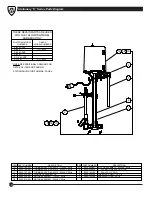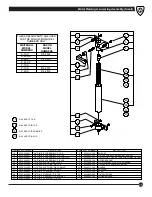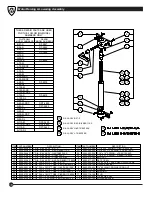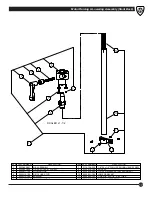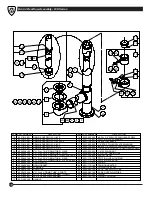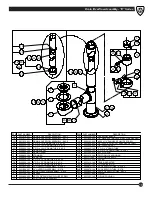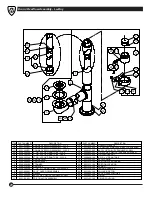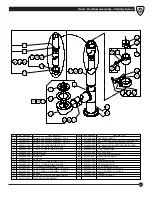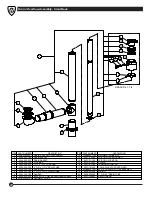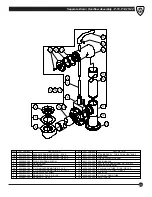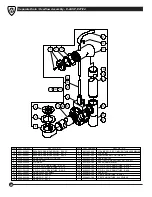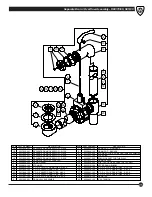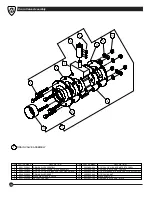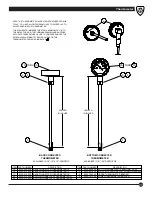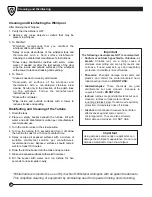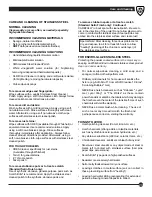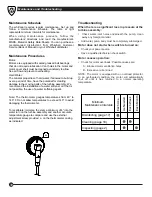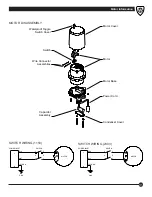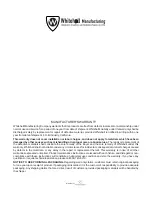
Cleaning and Disinfecting the Whirlpool
After draining the Whirlpool:
1. Verify that the turbine is OFF.
2. Remove any loose objects or debris that may be
present in whirlpool.
3. To Disinfect:
*Whitehall recommends that you disinfect the
whirlpool after each patient.
*Spray or wipe all surfaces of the whirlpool tank and
thermometer with a hard surface disinfectant,
following the disinfectant manufacturer's instructions.
*Rinse away disinfectant residue with warm, clean
water. If needed (or after the last patient of the day)
wipe the inside and outside surfaces of the whirlpool
with a towel to reduce streaking and spotting.
4. To Clean:
*Clean as needed, or weekly at minimum.
*Hand-wash all surfaces of the whirlpool and
thermometer with a non-abrasive stainless steel
cleaner. Scrub only in the direction of the polish lines
on the whirlpool. Follow the manufacture's
instructions for use.
*Rinse with cold water.
*Wipe inside and outside surfaces with a towel to
reduce streaks and spotting.
Disinfecting and Cleaning of the Turbine
1. Drain the tank.
2. Place an empty bucket beneath the turbine. Fill with
water and add disinfectant solution per manufacturers
recommended use.
3. Turn the control valve to the slow position.
4. Turn on the turbine for 5 seconds and turn it off. Allow
the turbine to soak for a 10 minute contact time.
5. Spray or wipe all exposed surfaces with a mixture of
suitable disinfectant solution per manufacture’s
recommended use. Exposed surfaces should remain
wet for at least 10 minutes.
6. Drain the turbine bucket into the tank and open drain.
7. Rinse all exposed surfaces with warm/hot water.
8. Fill the bucket with water and run turbine for five
seconds to rinse impeller cavity.
*Whitehall recommends the use of Hydrochlor® Whirlpool Antiseptic with all patient treatments.
This simplifies cleaning of equipment by eliminating need for repeated rinsing and scrubbing.
Important
The following chemicals are NOT recommended:
Sodium or calcium hypochlorite, chlorines, or
bleach:
Chloride ions are a major cause of
stainless steel pitting and are highly caustic and
corrosive. If used, wear skin, eye and respiratory
protection. Immediately rinse off residue.
Phenolics:
Phenolics damage metal parts and
plastics and distort the water-lubricated hard-
rubber bearing in turbine.
DO NOT USE.
Glutaraldehydes
: These chemicals are good
disinfectants but poor cleaners. Exposure to
vapors is harmful.
DO NOT USE.
Iodines:
Iodines are good disinfectants but poor
cleaners. Iodines corrode metal surfaces
including stainless steel. If used wear respiratory
protection. Immediately rinse off residue.
Alcohol:
Alcohol-based cleaners have limited
effectiveness against some common
microorganisms. They are also extremely
flammable and corrosive. DO NOT USE.
Ÿ
Ÿ
Ÿ
Ÿ
Ÿ
Important
Using abrasive compounds or applicators can
damage the whirlpool's appearance. Do not use
abrasive materials to clean the whirlpool.
Cleaning and Disinfecting
28

